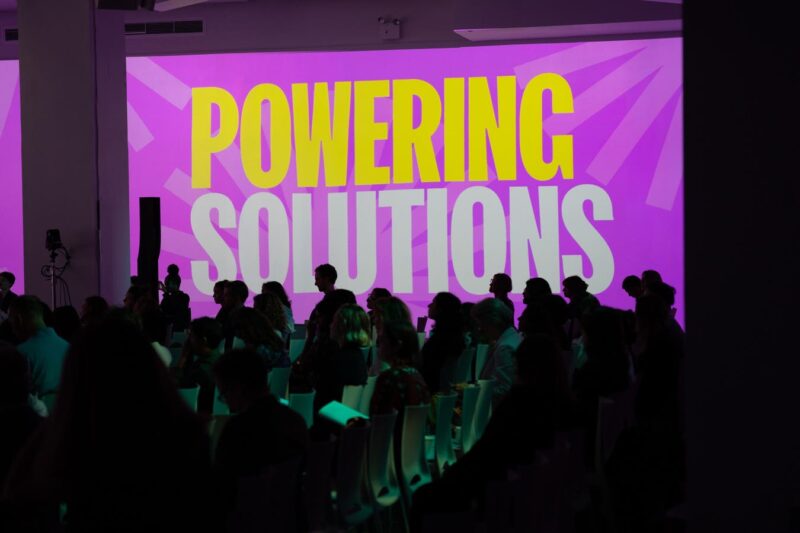Solutions House hosted creatives for climate week
Madison Swart
Previous New York Climate Week’s have covered announcements and activism, finance and frameworks. But this year, the true stars weren’t in policy papers or investment portfolios. They were on screen. From docuseries to thrillers, from extreme sport legends to soap-opera storylines, the power of film and television took centre stage.
In an era where climate, ESG and sustainability are beset with challenges, the fresh take by storytellers were a highlight of the week!
Solutions House: Stories at the Heart of Solutions
Solutions House, convened by Futerra alongside the Exponential Roadmap Initiative, has become known as the week’s gathering place for practical answers and improbable alliances. But in 2025, it leaned harder than ever into entertainment. Together with the Sustainable Entertainment Alliance (a consortium of the world’s biggest studios including Netflix, NBC Universal, Disney, Paramount, Sony, Warner Bros Discovery and more) it staged an afternoon of sessions under the banner “Solutions on Screen.”
The atmosphere was closer to a festival than a panel. The lineup drew showrunners, athletes, ministers, and activists into one room, united by the conviction that stories can accelerate solutions. Ellis Watamanuk of Rare’s Entertainment Lab and Meredith Milton of NRDC’s Rewrite the Future spoke of police procedurals’ unexpected role in shifting climate conversations. Alex Honnold and Tommy Caldwell, world-famous climbers featured in the Academy Award-winning film Free Solo, who redefine the limits of fear, shared how they translate extreme sports into extreme urgency. Actor Alysia Reiner and writer Anna Hagen revealed how The Diplomat deliberately weaves policy plotlines into prime-time intrigue, in a conversation with the UK Minister for Climate Katie White OBE. Acclaimed filmmaker and producer Sam Pollard traced the racial justice lessons of Netflix’s Katrina: Come Hell or High Water. And voices from the frontlines, from Heather McTeer Toney to Xiye Bastida, insisted that climate justice must be a co-author of every narrative. One of the most popular sessions was titled ‘Lets Make A Brand Deal’ and gathered brand leaders with film-makers for the launch of a new guide on the commercial opportunities of sustainability content.
What struck me wasn’t the novelty of hearing Hollywood speak climate. It was the seriousness with which the entertainment industry is beginning to regard itself as infrastructure. Panels weren’t about “raising awareness”, that limp phrase of yesterday’s communications, but about making brand deals, signing partnerships, and building narrative pipelines every bit as real as gas pipelines once were.
By the final evening, the Climate Creatives Cocktail brought together everyone from Netflix Sustainability Officer Emma Stewart to actress Alisha Wainwright to content creators, cross-pollinating ideas and contracts in equal measure. Solutions House didn’t just showcase content; it convened an industry.
Beyond the Bubble
Elsewhere in New York, entertainment wove through the week’s fabric. Kicking off Climate Week NYC, the second instalment of the Climate Film Festival screened 50 films including 32 premieres, ending with their inaugural Narrative Change Summit, which asked harder questions about who controls the story, how justice is represented, and what metrics we use for impact. On Governors Island, screenings such as Observer created collective experiences, inviting audiences into dialogue rather than leaving them passive. At The Hub Live, Rainn Wilson moved from sitcom fame to Arctic futures, while short documentaries like The Light Won’t Dim made solar empowerment tangible. Even the food systems community embraced theatre, with Food Tank staging Little Peasants, an immersive performance about union struggles in a café.
These weren’t side-events; they were central signals. Climate Week recognized the importance of the cultural conversation alongside the policy one. Governors Island pulsed with installations and projections, while across Manhattan, entertainment professionals swapped storyboards as eagerly as scientists swapped emissions data.
Why Entertainment Mattered This Year
There’s a reason entertainment loomed so large. Facts alone don’t carry revolutions. Data rarely changes dinner-table conversations. But characters, narratives, cliff-hangers, and catharsis shape imaginations and ignite action. In fact, just last month, new research by Rare demonstrated the power of storytelling, finding that a single episode of Grey’s Anatomy helped viewers better identify and protect themselves against the dangers of extreme heat.
Climate action requires more than technology and treaties. It requires storylines we can live inside. When a Netflix drama places sustainability solutions at the heart of its intrigue, millions absorb those stakes without ever stepping into a conference hall. When frontline voices shape their own depictions, justice is not an abstract report but a living, breathing narrative. And when the largest studios greenlight climate content, they shift what billions consider normal.
The danger, of course, is tokenism: the glacier cameo, the obligatory “eco-episode,” the clumsy lecture disguised as drama. But at this year’s Climate Week, the conversations made clear that this is not about green cameos. It is about narrative justice, creative integrity, and commercial muscle moving in tandem.
From Week to Season
If Climate Week 2025 will be remembered for anything, it will be for the way entertainment stopped being a guest at the table and started playing host. The message is simple but seismic: climate storytelling is not communications, it is infrastructure.
Because the future of climate is also the future of culture. And as Climate Week NYC proved this year, culture has the biggest audience of all.
As I walked between panels and screenings, one thought kept repeating itself: we can’t only decarbonise our economies, we must also regenerate our imaginations. And for that, we need film, TV and entertainment to keep rolling.









